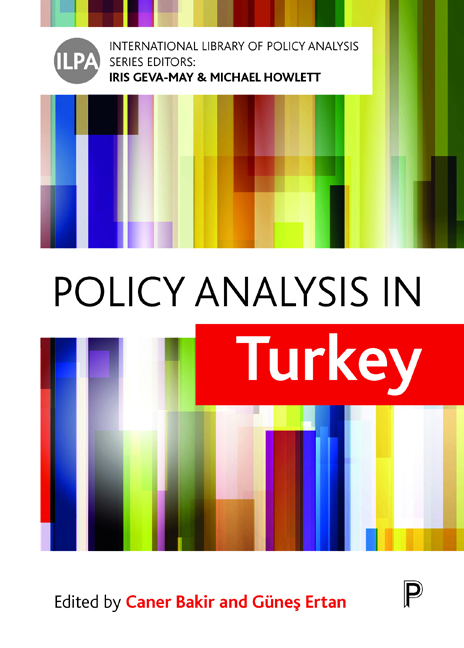Book contents
- Frontmatter
- Contents
- List of tables and figures
- Notes on contributors
- Editors’ introduction to the series
- one Pushing the pendulum from politics to policy: the state of policy analysis in Turkey
- Part One Historical roots, styles and methods of policy analysis in Turkey
- Part Two Policy analysis by governments
- Part Three Experts, international actors and public opinion
- Part Four Parties and civil society-based policy analysis
- Part Five Academic, bureaucratic and advocacy-based policy analysis
- Index
one - Pushing the pendulum from politics to policy: the state of policy analysis in Turkey
Published online by Cambridge University Press: 19 April 2022
- Frontmatter
- Contents
- List of tables and figures
- Notes on contributors
- Editors’ introduction to the series
- one Pushing the pendulum from politics to policy: the state of policy analysis in Turkey
- Part One Historical roots, styles and methods of policy analysis in Turkey
- Part Two Policy analysis by governments
- Part Three Experts, international actors and public opinion
- Part Four Parties and civil society-based policy analysis
- Part Five Academic, bureaucratic and advocacy-based policy analysis
- Index
Summary
Public policy as a discipline and a practice is predominantly concerned with the decision-making processes that are aimed at addressing societal problems. Policy analysis relates to tools of public policy implementation (for example, regulations) and formulation (for example, scenarios, cost-benefit and cost-impact analyses) (Jordan and Turnpenny, 2015). The most cited definition of policy analysis describes it as ‘… the activity of creating knowledge of and in the policy making process’ (Dunn, 1994, p 1, from Lasswell, 1970). Analysis of policy processes comprises scholarly research that aims at theorising policy-making processes and empirically evaluating the performance and consequences of existing policies. Analysis in policy denotes use of analytic techniques, mostly by expert practitioners, with the immediate aim of providing policy recommendations to policy-makers. We discuss why the research and practice in policy analysis is in its infancy and skewed towards the analysis of the policy process in Turkey.
Modern policy analysis is a recent discipline that emerged in the US as a result of successful collaboration between the military and scientific communities during the Second World War (deLeon, 2008). Soon this model of policy-making spread to other government departments, becoming a novel discipline and profession in the 1960s with the establishment of professional graduate schools of public policy akin to medical and law schools (Allison, 2008). Unlike most social sciences disciplines, policy analysis can be both normative, explicitly stating policy goals that ‘create and critique knowledge claims about the values of public policies’ (Dunn, 1994, p 3), as well as descriptive, in using the traditional tools of political science to decipher policy processes. Policy analysis is also problem-driven and relies on collaborations from multiple disciplines, since intractable policy problems consist of interactions of various sub-problems that frequently require expertise from more than one discipline (deLeon, 2008).
Considered one of the founders of policy analysis, Harold Lasswell (1951), who coined the term ‘policy sciences’ and characterised this new discipline as the ‘policy science of democracy’, argued that policy-making based on scientific evidence would be instrumental in eroding authoritarian regimes around the world. But many scholars criticised his vision, which dismissed the role of politics and ignored the inevitable clash of values, but nevertheless his vision included fundamental traits of democratic societies (see, for example, deLeon, 1997; Fischer and Gottweis, 2012).
- Type
- Chapter
- Information
- Policy Analysis in Turkey , pp. 1 - 16Publisher: Bristol University PressPrint publication year: 2018



